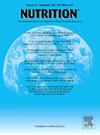Food insecurity among students in Open Distance and e-Learning in South Africa
IF 3.2
3区 医学
Q2 NUTRITION & DIETETICS
引用次数: 0
Abstract
Objective
Food insecurity is a widely studied phenomenon; however, studies documenting food insecurity among Open Distance and e-Learning students are sadly lacking. This paper aim of this paper is to study the prevalence of food insecurity among Open Distance and e-Learning students in South Africa. The purpose is to test the common assumption that Open Distance and e-Learning students do not struggle with food insecurity as they are typically living at home or employed.
Method
The method used in this paper was an online anonymous version of the Food Insecurity Experience Scale and was administered through Qualtrics.
Results
Only 27.9% (n = 2084) of respondents were food secure and mildly food insecure (score of 1 to 4), while those who were moderately food insecure constituted 16.7% (n = 1250) of the sample (score of 5 to 6) and those with severe food insecurity constituted 55% (n = 4130). The dependent variable was not normally distributed and therefore nonparametric measures were used to test for differences in groups, namely, the Kruskal–Wallis and the Mann–Whitney U tests.
Conclusion
The results show that African students are more likely to experience food insecurity compared to their counterparts, while there were no substantive differences in gender. Members of the LGBTQI community were also shown to be at higher risk of food insecurity. Those whose primary income was either grants or income from an informal business were at higher risk of food insecurity than those who worked full time. The findings of this study underscore the pervasive nature of food insecurity among students in South African Open, Distance and e-Learning education
南非远程开放教育和电子学习学生的粮食不安全问题。
目的:粮食不安全是一个被广泛研究的现象;然而,令人遗憾的是,缺乏对远程开放教育和电子学习学生中粮食不安全现象的研究记录。本文旨在研究南非远程开放教育和电子学习学生中普遍存在的粮食不安全问题。本文的目的是检验一个普遍的假设,即开放远程教育和网络教育的学生一般都住在家里或有工作,因此不会面临粮食不安全的问题:本文采用的方法是通过 Qualtrics 进行在线匿名版 "食物不安全体验量表 "的测试:只有 27.9% 的受访者(n = 2084)有粮食保障和轻度粮食不安全(1 至 4 分),而中度粮食不安全的受访者占样本的 16.7%(n = 1250)(5 至 6 分),严重粮食不安全的受访者占 55%(n = 4130)。因变量不呈正态分布,因此采用了非参数检验方法,即 Kruskal-Wallis 检验和 Mann-Whitney U 检验来检验组间差异:结果表明,与非洲裔学生相比,非洲裔学生更有可能遭遇粮食不安全问题,而性别方面则没有实质性差异。男女同性恋、双性恋、变性者和跨性别者群体成员的粮食不安全风险也更高。与全职工作的人相比,主要收入为补助金或非正规企业收入的人面临粮食不安全的风险更高。这项研究的结果凸显了南非开放教育、远程教育和电子学习教育中学生普遍存在的粮食不安全问题。
本文章由计算机程序翻译,如有差异,请以英文原文为准。
求助全文
约1分钟内获得全文
求助全文
来源期刊

Nutrition
医学-营养学
CiteScore
7.80
自引率
2.30%
发文量
300
审稿时长
60 days
期刊介绍:
Nutrition has an open access mirror journal Nutrition: X, sharing the same aims and scope, editorial team, submission system and rigorous peer review.
Founded by Michael M. Meguid in the early 1980''s, Nutrition presents advances in nutrition research and science, informs its readers on new and advancing technologies and data in clinical nutrition practice, encourages the application of outcomes research and meta-analyses to problems in patient-related nutrition; and seeks to help clarify and set the research, policy and practice agenda for nutrition science to enhance human well-being in the years ahead.
 求助内容:
求助内容: 应助结果提醒方式:
应助结果提醒方式:


